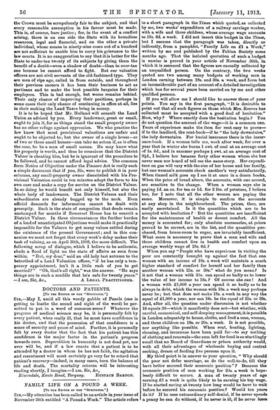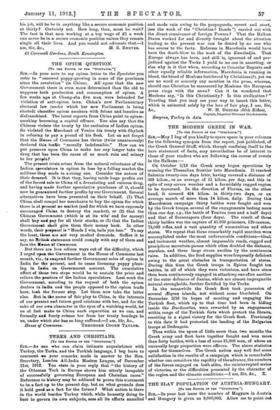to a short paragraph in the Times which quoted, as
collected by me, two weeks' expenditure of a railway carriage washer, with a wife and three children, whose average wage amounts to 19s. 6d, a week. I did not insert this budget in the Times, but I assume that the paragraph was taken, directly or indirectly, from a pamphlet, "Family Life on El a Week," -written by me and published by the Fabian Society some months ago. That the isolated quotation of such a budget is unwise is proved in your article of November 30th, in which it is assumed that the figures are casually collected by an unqualified person. On the contrary, the two weeks linoted are two among many budgets of working men in London earning between 18s. and 30s. a week, and form but an inconsiderable part of an account of a detailed investigation which has for several years been carried on by me and other qualified persons.
If you will allow me I should like to answer three of your points. You say in the first paragraph, "It is desirable to point out that all such figures as those which Mrs. Reeves has collected must be accepted with a good deal of hesitation." Now, why ? Where exactly does the hesitation begin ? You do not question the amount of the wage—it is a common one. Years of experience make the item for rent easy to prove—. if to the landlord, the rent-book—if to "the lady downstairs," the lady downstairs. For burial insurance there is the insur- ance-book. If a woman tells me, week after week, for over a year that in winter she burns 1 cwt. of coal at an average cost of is. 6d., and in summer perhaps 4 cwt. at an average cost of W., I believe her because forty other women whom she has never seen nor heard of tell me the same story. Her expendi- ture on gas will vary -with the size of her house and her family, but one woman's accounts check another's very satisfactorily. When tinned milk goes up I see it at once in a dozen books. When the price of bread alters, the accounts, with one accord, are sensitive to the change. W hen a woman says she is paying id. an oz. for tea or id. for 2 lbs. of potatoes, I believe her, for I note that all the other women are paying the same. Moreover, it is simple to confirm the accounts at any shop in the neighbourhood. The prices, then, are easily ascertained. Is it the quantities which are to be accepted with hesitation ? But the quantities are insufficient for the maintenance of health or decent comfort. All the money is accounted for; only absolute necessaries, at prices proved to be correct, are in the list, and the quantities pur- chased, from house-room to sugar, are invariably insufficient. What more is necessary to prove that a man and wife and three children cannot live in health and comfort upon an average weekly wage of 19s. 6d.?
When you say "People who have experience in visiting the poor are constantly brought up against the fact that one woman with an income of 18s. a week will maintain a much higher standard of comfort for herself and her family than another woman with 25s. or 30s." what do you mean? Is it not that a woman with 30s. can spend so badly as to lower the value of her income to 18g.? Of course she can ! And a woman with £1,000 a year can spend it so badly as to be always in debt, which the woman with 18s. a week may perhaps never be ; but that does not make 18s. a week in any way the equal of £1,000 a year, nor can 18s. be the equal of 25s. or 30s. And, after all, the question under discussion is not whether 18 equals 30—which it manifestly does not—but whether, with careful, economical, and self-denying management, it is possible in London adequately to house, clothe, and feed a man, woman, and three children on 18s. or 20s. a week. It is not possible, nor anything like possible. When rent, heating, lighting, cleaning, and insurance have been paid for—to say nothing of clothing and renewals—the sum left for food is so startlingly small that no Board of Guardians or prison authority would, with all their advantages of wholesale buying and central cooking, dream of feeding five persons upon it.
My third point is in answer to your question, "Why should the poor not defer marriage, as do the well-to-do, till they have better secured their economic position"? Because the economic position of men working for 20s. a week is hope- lessly difficult to secure. A man of twenty years of age earning a week is quite likely to be earning his top wage.
If he started saving at twenty how long would he have to wait before he secured his economic position? Would ten years do it? If he uses extraordinary self-denial, if he never spends a penny he can do without, if he never is ill, if he never loses his job, will he be in anything like a secure economic position at thirty P Certainly not. How long, then, must he wait ? The fact is that men working at a top wage of 21 a week can never be in a secure economic position unless they remain single all their lives. And you would not advocate that.-1











































 Previous page
Previous page